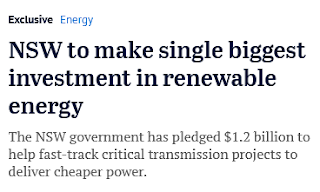For all of the talk of increasing electricity bills in Australia, I note that this month's bill for me (household of 3 adults) is $147 - a bit higher than last month, probably due to the number of times wet weather has necessitated the use of the clothes dryer.
According to websites I just looked at, this is a pretty average household price.
But what about energy rich (and often Republican controlled) American states? According to this website, they range from $80 a month to $150, with an average of around $111 a month. But convert that to AUD, and you get - $153 average. (The more expensive American states - and some seem to be Republican too - of $150 a month works out to $207 AUD.)
Now, to make a fair comparison, we cook on a stove top with bottled gas (one 9 lt bottle seems to last 2 to 3 months), but a replacement gas bottle is still are costing under $30. So I probably have another $150 or so in gas expenses, per year, or about $12 a month extra in non-electric "utility" costs.
My point is: for all of the talk of "soaring" gas and electricity costs coming our way, if you want to compare our cost of electricity with the "land of the free" (which has multiple power sources, including nuclear) - we're not doing too bad. Pretty comparable, really, but you wouldn't get that impression when reading the media.
Next up: don't get me started on people who don't like to switch what they eat when there's a temporary price rise due to floods and other factors. Yes, a $5.50 iceberg lettuce is expensive - but a butter leaf one in the same supermarket is still selling for $3. (I just checked!) Seriously, iceberg lettuce is a bit crap anyway, save for a very small number of dishes. But if they are expensive for a time, just avoid them, it's not going to hurt to eat another type of lettuce.
There is nearly always something that is still good, seasonal, value in the shops. I've noticed that potatoes and apples (and eggplants) are still cheap and plentiful. Sure, it's a pity if you want to use tomatoes at the moment, but they'll come down in price again soon enough. If you normally use them in a casserole, a can of crushed tomatoes from Italy is still ridiculously cheap and serves the same purpose.


%20_%20Twitter.png)



%20_%20Twitter.png)




